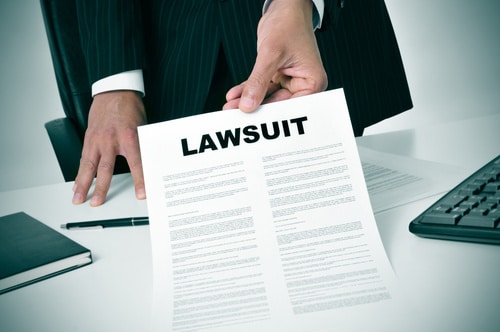You Have Been Sued!
A process server or Sheriff’s deputy just rang your doorbell and handed you a notice from a court clerk that says, “NOTICE. You have been sued.”
What do I do? What does all of this mean? What is an answer and how do I file it? How long do I have to answer? Why am I being sued in this Court? How long is this case going to last?
These questions will begin our new blog series discussing the civil litigation process.
What Courts are in Texas?
If you will remember from your high school government and civics
classes, the court system was set up as part of the checks and balances between the three branches of government.
Texas has several levels of courts, including: Municipal Courts, Justice of the Peace Courts, Statutory Probate Courts, County Courts, County Courts at Law, District Courts, Civil and Criminal Appellate Courts, and a State Supreme Court.
What about Jurisdiction and Venue?
Many different factors go into deciding in which court to file a case. Jurisdiction determines which court can hear the case. Where the case can be filed is controlled by venue.
What is a Citation?
The first thing to do if you have been sued is to read the documents you received fully and completely. Usually, this will answer a majority of your questions.
The first page of the documents is called the citation. This page tells you when the case was filed, how long you have to respond, if there is a hearing set, who the attorney for the other side is, if any, and in what court the case is set.
What is a Petition?
The petition is the document attached to the citation, normally titled as petition. A petition is the official and formal complaint filed with the court. The person who filed the case is called either the petitioner or plaintiff, depending on the type of case. The respondent or the defendant is the person against whom the case was filed.
What is an Answer?
The answer is the defendant or respondent’s first written response to the petition. It is where the party that was sued answers the complaints in the petition. There are numerous considerations in the types of answers to file.
Texas has a “due order of pleadings rule,” which means that some responsive pleadings must be filed in a specific order to avoid being waived. Filing an answer can become complicated, and every response should be carefully considered before filing the answer.
The answer is also where you can file what are called counter-claims against the person that sued you. Think of counter-claims as your own petition against the other party, but within the same lawsuit.
What is Discovery?
Once your case has begun, you might be served with discovery requests. In fact, discovery requests may be included in the petition or answer.
Discovery is the process by which you can obtain evidence from the other side. This process can be document intensive and time consuming, but it assists in limiting the issues for trial.
What is Mediation?
Mediation is a process where the parties and their attorneys, if any, meet with a neutral third party (the “mediator”) and try to work out the issues in the case to avoid the necessity for a trial. Trials are notoriously expensive and time consuming. For that reason, some courts will order mediation in civil cases in an attempt to save both parties the time and expense of pushing forward with a trial.
What is a Trial?
All final hearings are known as trials. Trials are either bench trials or jury trials.
Bench trials are hearings heard only by the judge, who decides the fact and legal issues. A jury trial is heard by a jury, which decides only the fact issues. In a jury trial, the judge will determine the legal issues based on the jury findings.
What is an Appeal?
An appeal may be filed after the judge enters a final judgment, whether in a jury trial or a bench trial. The appeal is the complaint to the appellate court alleging that the trial court made a mistake.
It is important to note that there are specific deadlines that apply to different types of appeals. Missing these deadlines will waive any appeals that could have been made.
Stay Tuned!
This blog provides a brief overview of the process of civil litigation. Additional blogs in this series will provide more detail regarding how to navigate a civil lawsuit in Texas.
–Authored by Emily D. Walterscheid, PP, PLS
Matthew Harris Law, PLLC – Civil Litigation Division
1001 Main Street, Suite 200, Lubbock, Texas, 79401-3309
Tel: (806) 702-4852 | Fax: (800) 985-9479

